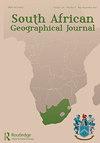Determinants of potential land reform beneficiaries’ willingness to relocate from their former homeland homestead farms to commercial farms
IF 1.4
4区 社会学
Q3 GEOGRAPHY
引用次数: 2
Abstract
ABSTRACT The South African land reform, particularly the aspect of land redistribution, has received strong criticism of being slow and inequitable, contrary to how it is envisaged in numerous land redistribution policies. Consequently, the recent report of the land reform advisory committee appointed by the president highlighted several issues in the understanding of land redistribution beneficiaries and recommended research to fill those knowledge gaps and inform policy design. This study therefore attempts to understand which factors could determine whether commercially oriented smallholders in the former homelands, who are regarded as potential land redistribution beneficiaries, would be willing to relocate to commercial farms formerly owned by white farmers. This objective is achieved by implementing a binary logistic regression to a sample of 454 commercially oriented smallholders, purposively and randomly surveyed in KwaZulu-Natal and Limpopo. The results show that age, number of schooling years (education), dwelling asset base and feeling constrained by farming in the former homeland can predict the likelihood of relocating. Marginal effects suggest that education, dwelling asset base and feeling constrained by farming in the former homeland have more weight in predicting beneficiary relocation likelihood (dependent variable). Based on these findings, the article makes recommendations for land redistribution policies.潜在的土地改革受益者愿意从他们以前的家园家园农场迁移到商业农场的决定因素
南非的土地改革,特别是土地再分配方面,受到了强烈的批评,被认为是缓慢和不公平的,这与许多土地再分配政策所设想的相反。因此,总统任命的土地改革咨询委员会最近的报告强调了对土地再分配受益者的理解中的几个问题,并建议进行研究以填补这些知识空白,并为政策设计提供信息。因此,本研究试图了解哪些因素可以决定被视为土地再分配潜在受益者的前家园中以商业为导向的小农是否愿意搬迁到以前由白人农民拥有的商业农场。这一目标是通过对夸祖鲁-纳塔尔省和林波波省454名以商业为导向的小农样本实施二元逻辑回归来实现的,这些样本是有目的和随机调查的。结果表明,年龄、受教育年数、居住资产基础和对原籍农业的约束感可以预测迁移的可能性。边际效应表明,教育、住房资产基础和对原家园农业的约束感在预测受益人搬迁可能性(因变量)方面具有更大的权重。基于这些发现,本文提出了土地再分配政策的建议。
本文章由计算机程序翻译,如有差异,请以英文原文为准。
求助全文
约1分钟内获得全文
求助全文
来源期刊

South African Geographical Journal
GEOGRAPHY-
CiteScore
3.40
自引率
7.10%
发文量
25
期刊介绍:
The South African Geographical Journal was founded in 1917 and is the flagship journal of the Society of South African Geographers. The journal aims at using southern Africa as a region from, and through, which to communicate geographic knowledge and to engage with issues and themes relevant to the discipline. The journal is a forum for papers of a high academic quality and welcomes papers dealing with philosophical and methodological issues and topics of an international scope that are significant for the region and the African continent, including: Climate change Environmental studies Development Governance and policy Physical and urban Geography Human Geography Sustainability Tourism GIS and remote sensing
 求助内容:
求助内容: 应助结果提醒方式:
应助结果提醒方式:


